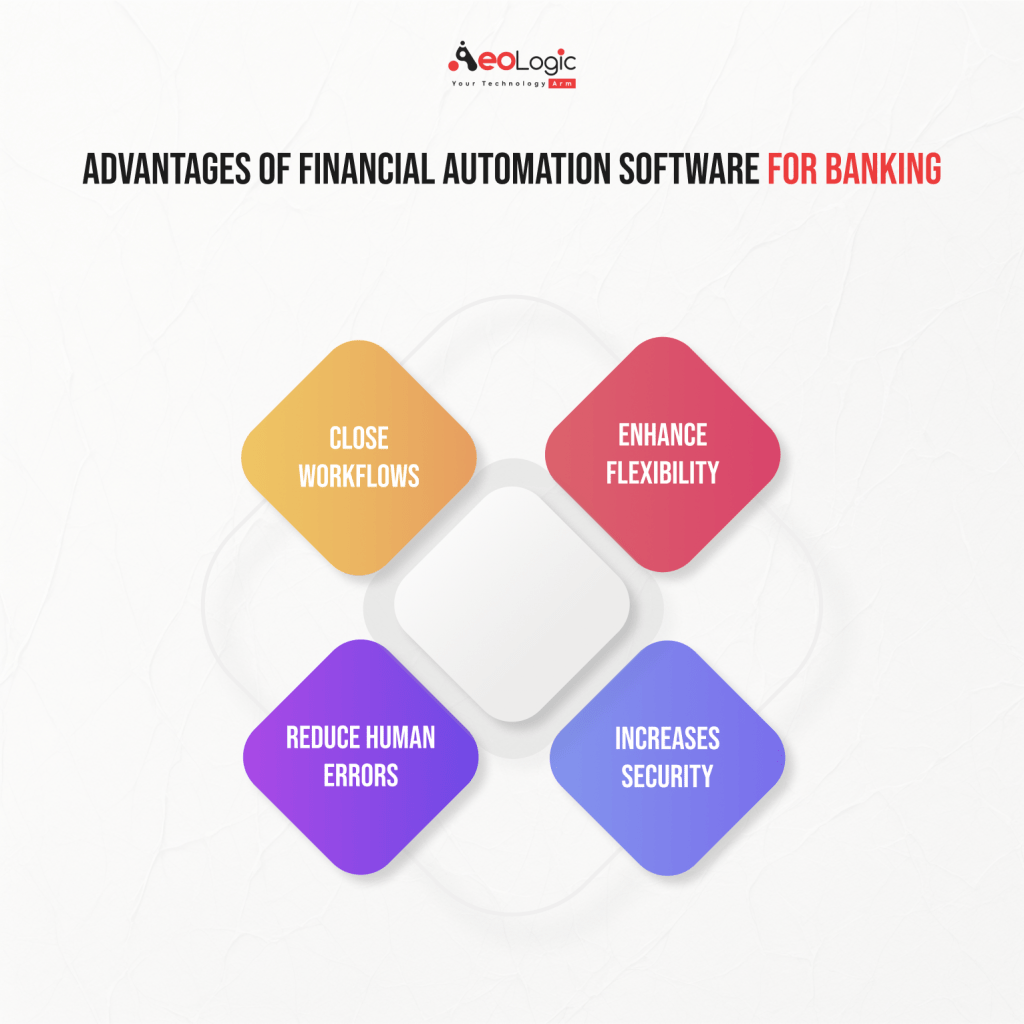The banking industry is among the major industries in the world that take care of funds, financial aspects, transaction records, etc. The banking sector has been served by employees for many years, which sometimes leads to errors, mistakes, etc. This causes severe loss in the banking industry and overall impacts the world economy. There are also drops in accuracy seen at various stages that need to be resolved with some powerful tool. Technology can be the factor that can bring change and evolution. Even many nations have developed technology in the banking industry to enhance financial tasks. Automation is one of the solutions that can resolve the problem of inaccuracy, and increase productivity, and other aspects. Automation generally refers to the software that enters into a system to automate various tasks and automation in banking can be said to be financial automation software.
Automation solutions is one of the fastest-expanding software sectors, with a current market value of $6.1 billion and a forecasted growth rate of 200%. The global banking process automation market size is anticipated to achieve a value of roughly USD 19.1 Billion by 2032, a substantial rise from its 2022 value of USD 3.0 Billion, at a compound annual growth rate (CAGR) of 23.7% during the forecast period from 2023 to 2032.
In this article, we will understand how financial automation software could benefit the banking industry and also see other aspects. Since it’s about technology then we will also see some challenging parts too.
What is Financial Automation Software?
In simple words, Financial automation is the process of automating financial processes that were previously done by hand using software and other technologies. This includes account reconciliations, journal entries for the general ledger, financial statement preparation, and event planning. Generally, in automation financial tasks can be possible by the integration of Artificial intelligence and machine learning. This integration enables us to improve many areas such as financial analysis, payroll administration, invoice automation, collections action, and preparing financial statements.
How does Automation Software Help in Banking Sector?
Automation has its unique ability as it developed with the help of Artificial intelligence. AI can analyze patterns and automate repetitive processes. Financial automation is the process of optimizing the customer experience and increasing the efficiency of all banking operations, including client accounting, deposit and withdrawal management, renewals, acquisition, and retention with the algorithm of AI and ML. These both are too effective with each other.
Also Read: Cloud-Based Fraud Prevention Solutions for Banking Industry
Features of Financial Automation Software
Every technology has its features so automation does. There are a lot of features of financial automation software as here are a few key features mentioned below.
Accuracy and Precision
The banking industry is involved in many sensitive procedures and any little mistakes could cause money loss. Manually handling financial services has a high chance of making mistakes where the financial automation software has the ability of accurate. This technology reduces the risk of human error, so financial process automation software ensures accurate data entry and record.
Reporting
Reporting refers to the process of recording and representing a company’s financial data. This can be time-consuming and inaccurate while reporting with a manual system or traditional way of reporting. However with the financial automation system, it could be easy and many times faster to generate financial statements, budget reports, and other financial documents.
Accounts Payable
Automating accounts payable is one of the most important services of the banking industry as it involves invoice capture, approvals, payment authorization, and payment execution. This saves a lot of time as all mentioned processes could be done by this technology.
Advantages of Financial Automation Software for Banking

Above mentioned features of financial automation software enable many benefits in the banking industry as here are a few key benefits mentioned below.
Close Workflows
Employees can handle a more reasonable burden with the use of financial automation, which does away with the necessity for manual transaction matching and balancing. Accounting employees have more time to concentrate on the exceptions while adhering to stringent norms and regulations when the financial closing process is expedited.
Enhance Flexibility
Inconceivable changes in the economy and industries cause adjustments within financial institutions. As more banking and financial operations transition to a predominantly digital, remote environment, the need for financial automation grows. Manual procedures are not only difficult to update and track across organizations, but they can also be challenging to traverse when new workflows are implemented.
Reduce Human Errors
As automation software has the ability of Artificial intelligence and machine learning, it can improve the reduced rate of the banking industry. Mostly many minute errors occur during the reconciliation process. By implementing automation, organizations can reduce the errors or reconciliation process.
Increases Security
While financial automation software is AI-powered then it is also very beneficial in terms of security. AI and ML enhanced the security of the banking industry’s data and accounts that do not breach of system easily.
Reduce Risk
Inaccurate financial reporting can significantly harm a bank’s operations. When laws and tight compliance criteria are added, the margin for error is significantly reduced. If repeated differences are not addressed and resolved, they can harm a company’s reputation and lead to noncompliance or fraud. Automating some operations in the financial close process reduces the chance of human error while increasing accuracy, effectively limiting possible write-off risk.
Also Read: Digital Transformation in Banking: Benefits and Examples
Challenges with Financial Automation Software
We have seen only good aspects of financial automation software but it is necessary to know the challenging part too. There are a few challenges with this technology as there are few mentioned below.
- Engaging employees in the change can be a challenge as it is not easy for staff members to easily engage and gain an understanding of this technology.
- The initial cost of implementation is also so high that many organizations cannot afford it with ease. So it could be another challenge too.
- AI indeed provides enhanced security but the risk of data breaching is always on. If data breaches by any means then it could be very offensive.
Also Read: The Role of Automation in Streamlining Banking Operations
Final Words
The future of accounting and finance lies in automated financial processes. Software for automating financial processes is concerned in a few ways like pricing but it also offers the potential to improve productivity, accuracy, cost savings, efficiency, and transparency. The positive side of this technology can easily eliminate the negative side. Overall, every organization needs to implement this technology to improve their financial services. The government should also implement this technology on a priority basis to improve the finance sector as citizens can build trust in the banking industry.
Develop smarter, faster, and more secure solutions with an experienced software development company aligned to your business objectives.

I’m Deepika Pandey, an SEO strategist and content writer with 6+ years of experience. I create SEO-friendly content that drives traffic and engages readers. I combine data insights with creativity to help businesses grow their online presence effectively.







